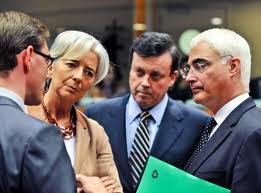European finance ministers met to discuss how they can strengthen the banking sectors and manage their economies. The meeting was held in Brussels Tuesday. While they discussed issues regarding the region’s economy, they didn’t come with solutions to the euro financial crisis.
The three year old European financial crisis was caused by a weak banking sector as well as the inadequate monitoring of national budgets. Several countries in the region suffered with too much debt. Solutions must be found in those areas in order to end the current debt crisis as well as prevent it from happening again in the future.
European leaders have agreed that they must relinquish some amount of sovereignty in order to solve the problems. The European Central Bank must be in charge of the banks in the 17 countries that use the euro by as early as next year.
Implementing the ideas can be difficult. Germany doesn’t want to give up control of its banks. Britain stated that a coordinated Eurozone banking sector could have a greater say in discussions over regulations that apply to all 27 nations of the European Union. Some of the countries are concerned that they would get voter backlash by giving too much power to the Commission.
Months of heightened activity regarding the supervision of banking and economy were experienced as the EU tries to solve the debt crisis. Austrian Finance Minister Maria Fekter said that making a single supervisor for all the banks could require a new treaty. That would delay the EU’s timeline of getting a supervisor.
It was still unclear how the markets would wait for a supervisor. There are speculations that the report that would be released later this week would show the Eurozone to drop into recession, which is defined as two quarters in a row of economic contraction. Germany has slowed down and is evident with the drop in the ZEW investor confidence survey.
